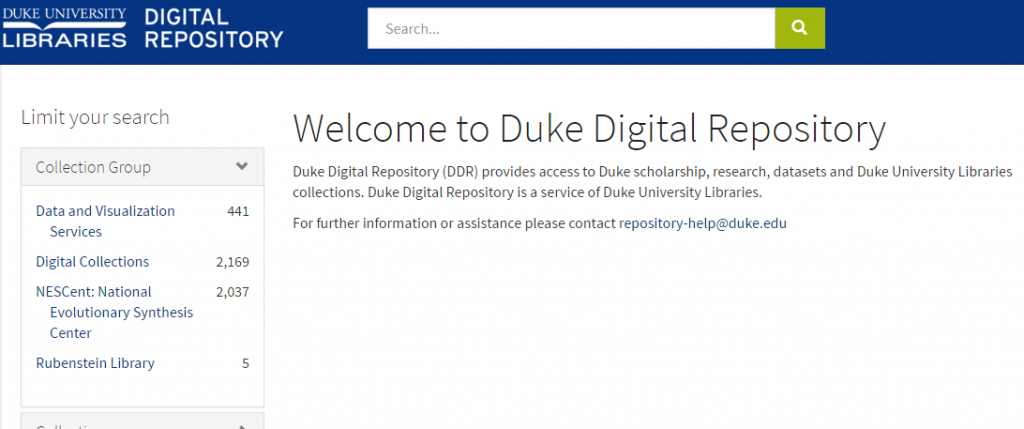Our modern day lives and professional endeavors are teeming with digital output. We participate in the digital ecosystem every day, contributing our activities, our scholarship, and our work in new and evolving ways. Some of that contribution gets lost in the Internet ether, and some gets saved, or preserved, in specific, often localized ways that are neither sustainable nor preservable for the long haul. We here at the Duke University Libraries, want to be able to look to the future with confidence, knowing that we have a game plan for capturing and preserving digital objects that are necessary and vital to the university community. Queue the new Duke Digital Repository.
The Duke Digital Repository is a software development initiative undertaken by the Digital Repository Services department in the Duke University Libraries. It is a preservation repository architected using the Fedora Open Source software project, which is intended to replace the current manifestation of our institutional repository, Duke Space. It is a superior product that is provisioned specifically for the preservation, storage, and access of digital objects. The Duke Digital Repository is fully operational; we are now in the process of refining user interfaces, ingesting new and varied collections, and assessing descriptive metadata needs for ingested collections.
So what’s next? Well we’ve got the Duke Digital Repository as a platform, now we need the Duke Digital Repository as a program. We need to clarify the services and support that we offer to the university community, we need to fully define its stakeholders, and we need to implement an organizational structure to support a robust service.
Here are just a few things that we’re engaged in that are seeking to define our user groups and assess their needs in a preservation platform and digital support service. Defining these expectations will allow us to take the next step in crafting a sustainable and relevant program to support the digital scholarship of the university.
- ITHAKA Faculty Survey: In the Fall semester of 2015, the Libraries deployed the ITHAKA S+R Faculty Survey. Faculty are considered a primary stakeholder of the repository, as it is well provisioned to meet their data management needs. 260 faculty members responded to the survey, sharing their thoughts on a variety of topics including scholarly communications services, research practices, data preservation and management needs, and much more. There was a lot of valuable, actionable data contributed, which pertains directly to the repository as a preservation tool, and a service for data support. The digital repository team is working through this data to identify and target needs and desires in a repository program.
- Graduate & Undergraduate Advisory Boards: The Digital Repository staff are also working with the Assessment & User Experience team within the library to reach out to graduate and undergraduate student constituents to capture their voice. We have collectively identified a list of questions and prompts that will engage them in a discussion about their needs pertaining to the repository as a tool and a service. From this discussion we are also gauging their understanding of ‘a repository’ and hoping to glean some information that will help us to understand how we might brand and market the repository more effectively.
- Fedora Community: Fedora is an open source software product developed and stewarded by the DuraSpace community. The Duke University Libraries are active participants in the community which is essentially a consortium of academic institutions that are working toward a common goal of preserving intellectual, cultural, and scientific heritage. We are reaching out to our community constituents to ask how other institutions similar to ours are supporting their repository programs. We’re assessing various models of support and generating a discussion around repository support as a resourced program, rather than a simple software solution. We are also working with Assessment & User Experience to conduct an environmental scan and literature review to gain greater insight and understanding of best practice.
In short, we want to make the repository special, and relevant to its users. We want to feel confident that it provides a service that is valuable and necessary for our university community. We invite your feedback as we embark on this effort. For further information or to give us your feedback, please contact us.





